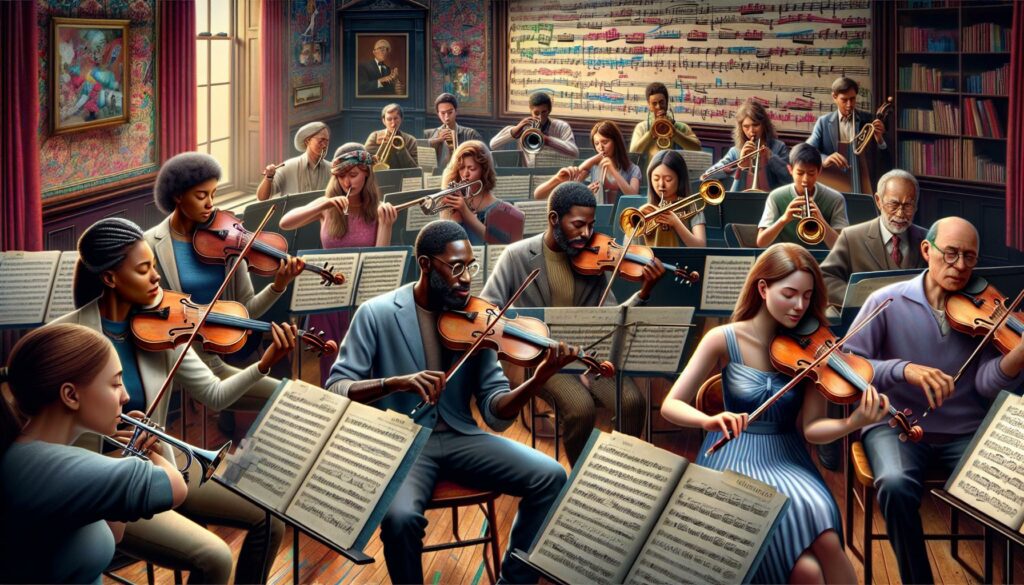As a music educator for over a decade I’ve witnessed countless students transform their musical dreams into reality through dedicated study at music school. The journey from beginner to accomplished musician is both challenging and rewarding offering unique opportunities for creative expression and personal growth.
Music schools provide more than just instrument lessons – they’re vibrant communities where aspiring musicians develop their skills collaborate with peers and learn from experienced professionals. Whether you’re interested in classical piano jazz saxophone or modern music production these institutions offer specialized programs tailored to help students reach their full potential. I’ve seen firsthand how the right music education program can shape not only a student’s musical abilities but also their discipline focus and confidence.
Key Takeaways
- Music schools offer diverse programs from classical conservatories to community centers, providing specialized training in performance, theory, production, and music business.
- Students in music education programs show significant academic improvements, scoring higher on SATs and developing enhanced cognitive abilities, memory, and problem-solving skills.
- Professional facilities include soundproof practice rooms, recording studios, performance venues, and digital labs, supported by experienced faculty providing one-on-one instruction and group workshops.
- Music school graduates can pursue various careers, from traditional performance roles ($28,000-$143,000/year) to emerging fields like music technology, therapy, and business administration.
- Annual costs range from $15,000-$50,000 for tuition, with additional expenses for instruments, materials, and housing, though numerous financial aid options and scholarships are available.
The World of Music School
A music school is an educational institution dedicated to teaching music theory, performance techniques, and practical musical skills. These specialized centers foster artistic development through structured curricula, expert instruction and performance opportunities.
Types of Music Schools Available
Music schools vary in their scope and educational approach:
- Conservatories: Professional institutions focusing on classical music performance training with rigorous admission standards
- University Music Departments: Academic programs offering bachelor’s master’s and doctoral degrees in music-related fields
- Community Music Schools: Local centers providing music education to students of all ages and skill levels
- Private Music Academies: Independent schools specializing in specific genres instrumental training or performance methods
- Preparatory Schools: Pre-college programs preparing young musicians for professional music education
- Performance Studies: Classical instrumental vocal jazz ensemble performance training
- Music Education: Teaching certification programs for aspiring music instructors
- Music Production: Audio engineering recording technology digital composition courses
- Music Theory: Advanced study of harmony composition music analysis
- Music Therapy: Clinical applications of music for therapeutic purposes
- Music Business: Industry management marketing artist development programs
- Ethnomusicology: Study of music in cultural historical contexts
- Composition: Original music creation orchestration arranging techniques
| Program Type | Average Duration | Career Opportunities |
|---|---|---|
| Performance | 4-6 years | Professional Performer Orchestra Member Session Musician |
| Education | 4 years | School Music Teacher Private Instructor Band Director |
| Production | 2-4 years | Sound Engineer Producer Studio Manager |
| Business | 4 years | Artist Manager Publisher Label Executive |
The Benefits of Music Education
My extensive research in music education has revealed numerous advantages that extend far beyond learning to play an instrument. Here’s how music education impacts different aspects of student development:
Cognitive Development and Academic Performance
Music education enhances brain function through multiple cognitive processes. Students who participate in music programs score 63 points higher on verbal SAT tests and 44 points higher in math compared to non-music students. I’ve observed how musical training develops:
- Improved memory retention through learning complex musical patterns
- Enhanced problem-solving skills from reading musical notation
- Strengthened mathematical abilities via rhythm counting exercises
- Increased language processing through lyrics comprehension
- Better spatial-temporal skills from understanding musical structures
- Boosted self-confidence through public performances
- Developed teamwork skills in ensemble settings
- Enhanced empathy through collaborative music-making
- Improved stress management via creative expression
- Strengthened cultural awareness through diverse musical styles
- Built lasting friendships within musical groups
| Academic Area | Improvement % in Music Students |
|---|---|
| Verbal SAT | +63 points |
| Math SAT | +44 points |
| Emotional Intelligence | +40% |
| School Attendance | +93.3% |
| GPA | +20% |
Inside a Music School Environment
A music school’s environment combines professional-grade facilities with expert instruction to create an immersive learning experience. The physical space and educational approach work together to support students’ musical development.
Facilities and Equipment
Music schools feature specialized practice rooms equipped with professional instruments for optimal learning conditions. Each facility includes:
- Soundproof individual practice rooms with built-in recording capabilities
- Large ensemble rehearsal spaces fitted with acoustic treatments
- Professional recording studios with industry-standard equipment
- Performance venues ranging from intimate recital halls to large auditoriums
- Digital music labs with MIDI keyboards, audio interfaces & production software
- Instrument storage lockers with climate control systems
- Music libraries containing scores, recordings & reference materials
Faculty and Teaching Methods
The faculty comprises experienced musicians who bring diverse expertise to their teaching approaches. These professionals incorporate:
- One-on-one instruction tailored to each student’s skill level
- Master classes led by visiting artists & industry professionals
- Group workshops focusing on specific techniques or genres
- Technology-integrated lessons using digital learning tools
- Regular performance evaluations through juries & recitals
- Collaborative projects between different departments
- Mentorship programs connecting students with faculty
| Teaching Format | Weekly Duration | Student-Teacher Ratio |
|---|---|---|
| Private Lessons | 30-60 minutes | 1:1 |
| Group Classes | 90-120 minutes | 1:8-12 |
| Ensembles | 120-180 minutes | 1:15-30 |
| Masterclasses | 180 minutes | 1:20-40 |
The Student Experience
Music school students engage in a structured yet dynamic educational journey that combines rigorous practice with diverse performance opportunities. The daily schedule balances technical training individual practice sessions ensemble rehearsals.
Daily Life and Practice Routines
A typical music student’s day starts at 8:00 AM with music theory or history classes followed by individual practice sessions. Students dedicate 3-4 hours to focused instrument practice incorporating:
- Warm-up exercises: 30-minute technical drills scales arpeggios
- Repertoire development: 90-minute sessions on assigned pieces
- Sight-reading practice: 45-minute daily exercises with new sheet music
- Collaborative rehearsals: 2-hour sessions with chamber groups orchestras
- Music technology labs: 60-minute sessions for recording digital composition
Students maintain practice logs track their progress establish specific goals for each session. Between practice sessions they attend masterclasses workshops specialized seminars related to their instrument or concentration.
Performance Opportunities
Music schools provide numerous platforms for students to showcase their abilities including:
- Weekly studio recitals: Intimate performances for peer feedback
- Large ensemble concerts: Symphony orchestra chamber choir jazz band
- Chamber music series: Small group performances in various venues
- Student showcase events: Cross-department collaborative presentations
- Community outreach concerts: Performances at local schools hospitals
- Competition participation: Internal external performance contests
- Professional venue appearances: Guest performances with established orchestras
Performance schedules typically include:
| Event Type | Frequency | Duration |
|---|---|---|
| Studio Recitals | Weekly | 1 hour |
| Ensemble Concerts | Monthly | 2 hours |
| Chamber Performances | Bi-monthly | 90 minutes |
| Major Productions | Quarterly | 2-3 hours |
Each performance opportunity integrates professional recording services documentation for portfolio development career advancement.
Career Paths After Music School
Music school graduates access diverse career opportunities in both traditional music professions and alternative fields. The comprehensive skills developed during music education create pathways across multiple industries.
Professional Music Careers
Professional music careers encompass performance-based positions in orchestras, bands, opera companies, and musical theater productions. Here are key professional paths:
- Performance Careers:
- Orchestra Musicians ($28,000-$143,000 annually)
- Opera Singers ($45,000-$300,000 per season)
- Studio Musicians ($100-$400 per session)
- Concert Soloists ($500-$5,000 per performance)
- Education Roles:
- University Professors ($65,000-$130,000 annually)
- Private Music Teachers ($30-$120 per hour)
- School Music Directors ($45,000-$85,000 annually)
- Band Directors ($42,000-$78,000 annually)
- Music Industry Positions:
- Sound Engineers ($35,000-$150,000 annually)
- Music Producers ($30,000-$200,000 annually)
- Artist Managers ($40,000-$150,000 annually)
- Music Publishers ($45,000-$120,000 annually)
- Business Sector:
- Arts Administration
- Music Marketing
- Event Management
- Copyright Law
- Technology Field:
- Music Software Development
- Digital Audio Production
- Music App Design
- Virtual Reality Audio
- Healthcare Industry:
- Music Therapy ($40,000-$70,000 annually)
- Sound Healing
- Recreational Therapy
- Research in Music Psychology
- Media & Entertainment:
- Film Scoring
- Video Game Audio
- Music Journalism
- Radio Programming
The Cost of Music Education
Music education expenses vary significantly across different types of institutions, with annual tuition ranging from $15,000 to $50,000 at top conservatories and universities.
Tuition and Additional Expenses
The comprehensive cost of music education extends beyond basic tuition fees. Here’s a breakdown of typical annual expenses:
| Expense Category | Average Cost Range |
|---|---|
| Undergraduate Tuition | $15,000 – $50,000 |
| Room and Board | $10,000 – $15,000 |
| Instrument Purchase/Rental | $500 – $20,000 |
| Sheet Music & Materials | $200 – $500 |
| Private Lessons | $2,000 – $5,000 |
| Performance Attire | $300 – $800 |
| Technology Fees | $500 – $1,000 |
Additional costs include:
- Insurance for instruments
- Travel expenses for competitions
- Recording equipment for portfolios
- Professional association memberships
- Summer program fees
Financial Aid and Scholarships
Music schools offer multiple funding options to support talented students. Available financial resources include:
- Merit-based scholarships for exceptional performers
- Need-based grants from institutional funds
- Federal student aid programs
- Talent-specific awards from music organizations
- Performance competition prizes
- Work-study opportunities in:
- Teaching assistantships
- Library positions
- Administrative roles
- Concert hall management
Notable scholarship programs:
| Program Type | Award Range |
|---|---|
| Full-Ride Merit | $30,000 – $50,000/year |
| Department Scholarships | $5,000 – $15,000/year |
| Performance Awards | $1,000 – $10,000/year |
| Summer Study Grants | $2,000 – $5,000 |
Private music schools often maintain relationships with donors who provide dedicated scholarship funds for specific instruments or programs.
Music schools represent a gateway to endless possibilities in the world of music and beyond. Through my years of experience I’ve witnessed how these institutions shape not just musicians but well-rounded individuals ready to tackle life’s challenges.
The combination of rigorous training professional facilities and expert guidance creates an environment where talent flourishes and dreams take flight. Whether you’re pursuing a career as a performer educator or industry professional a music school education equips you with invaluable skills that extend far beyond the musical realm.
I truly believe that investing in a music education is more than just learning notes and rhythms – it’s about discovering yourself growing as an artist and joining a lifelong community of passionate musicians who share your love for this universal language.



